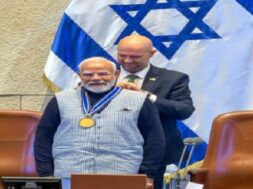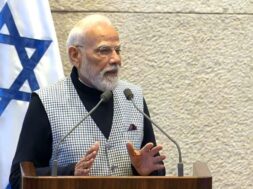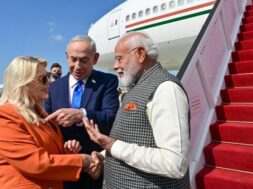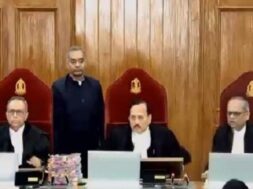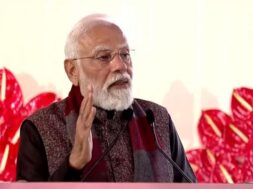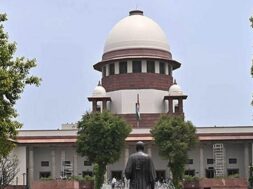
Virendra Pandit
New Delhi: The 11-day-long conflict between Israel and Iran-supported Hamas came to an inconclusive halt early on Friday as thousands of Palestinians rallied overnight with some claiming it as an expensive victory for the Islamic militant group Hamas, which has been ruling Gaza Strip since 2007.
This was the fourth clash between Israel and Hamas, which now claims to represent all Palestinians.
The ceasefire came after US President Joe Biden’s intervention and a fresh possibility of a thaw in the Saudi-Iran relations, amid intense speculation that Tehran could curtail or stop aid to Hamas in return for America’s nod to end sanctions and revive the nuclear deal.
The truce was brokered by neighboring Egypt after the US pressed Israel to de-escalate the offensive.
The 11-day war left more than 240 dead, mostly Palestinians, and left behind —widespread devastation to the already impoverished Hamas-ruled Gaza Strip, media reports said. At least 230 Palestinians—including 65 children and 39 women—died and 1,710 people wounded, according to the Gaza Health Ministry, which does not break the numbers down into fighters and civilians.
Twelve people in Israel, including a 5-year-old boy and a 16-year-old girl, were also killed.
But it is too early to say when the hostilities will resume as hundreds of thousands of jubilant Palestinians are set to attend weekly prayers at the Al Aqsa Mosque in Jerusalem and other places to pay homage to the ‘war martyrs’ on Friday and afterward.
Their celebratory protests in Jerusalem could spark confrontations with Israeli police, setting in motion yet another cycle of escalation like the one that led to the war, media reported.
Thousands of Palestinians took to the streets of the Gaza Strip as the cease-fire took hold at 2 am. Young men waved Palestinian and Hamas flags, shared sweets, honked horns, and set off fireworks. Spontaneous celebrations also broke out in east Jerusalem and across the occupied West Bank, according to media reports.
Thousands gathered Friday morning in the southern Gaza Strip town of Khan Younis outside the family house of Mohammed Deif, the shadowy Hamas commander who had ordered the rocket attacks. Supporters shouted “victory” and waved green Hamas flags.
In contrast, the mood was mellowed in Israel, where Prime Minister Benjamin Netanyahu faced angry charges from his right-wing base that he had halted the war too soon. His supporters were egging him on to continue the war until Israel broke Hamas’ backbone.
Like the three previous wars between the bitter enemies, the latest round of fighting ended inconclusively. Israel claimed to have inflicted heavy damage on Hamas with hundreds of bruising airstrikes but once again was unable to halt many of the missiles Hamas threw into the Jewish country.
Hamas also claimed victory, despite the horrifying toll the war took on countless Palestinian families who lost loved ones, homes, and businesses. It now faces the daunting challenge of rebuilding in a territory already suffering from high unemployment and a coronavirus outbreak.
Netanyahu announced that Israel had accepted the proposal late Thursday while emphasizing that the “reality on the ground will determine the future of the campaign.”
U.S. Secretary of State Antony Blinken plans to visit the region in the coming days “to discuss recovery efforts and working together to build better futures for Israelis and Palestinians,” the State Department said.
The fighting began on May 10, when Hamas militants in Gaza fired long-range rockets toward Jerusalem. The barrage came after days of clashes between Palestinian protesters and Israeli police at Al-Aqsa. Heavy-handed police tactics at the compound and the threatened eviction of dozens of Palestinian families by Jewish settlers had inflamed tensions.
Both the Jews and the Muslims consider the Al Aqsa Mosque compound as sacred. While the Jews believe it was where the Second Temple of King Solomon existed, whose wall still exists, the Muslims believe their Prophet Muhammad had traveled from the same site to meet Allah in Paradise. The place now houses the Dome of the Rock alongside the Al Aqsa in the same compound.
The two communities’ competing claims to Jerusalem lie at the heart of the Israeli-Palestinian conflict and have repeatedly triggered bouts of violence in the past.
Since May 10, Hamas and other militant groups fired over 4,000 rockets at Israel throughout the fighting, launching the projectiles from civilian areas of the Gaza Strip at Israeli cities. Dozens of projectiles flew as far north as Tel Aviv, the country’s bustling commercial capital.
In retaliation, Israel carried out hundreds of airstrikes targeting what it said was Hamas’ military infrastructure, including a vast tunnel network in the Gaza Strip.
The United States had initially backed Israel’s “right to self-defense” against indiscriminate rocket fire. But as the fighting dragged on and the death toll mounted, the Americans increasingly pressured Israel to stop the offensive.
In a rare public rift, Netanyahu on Wednesday briefly rebuffed a public call from President Joe Biden to wind things down, appearing determined to inflict maximum damage on Hamas in a war that could help save his political career.
But late Thursday, the Israeli PM’s office announced the cease-fire agreement. Hamas quickly followed suit. Militants continued to launch the sporadic rockets at Israel early Friday before the 2 am cease-fire took effect.
In Washington, Biden hailed the cease-fire. “I believe we have a genuine opportunity to make progress, and I’m committed to working for it,” he said.
He said the US was committed to helping Israel replenish its supply of interceptor missiles for its Iron Dome rocket defense system and to working with the internationally recognized Palestinian Authority—not Hamas —to provide humanitarian aid to Gaza.
Although both Hamas and the smaller Islamic Jihad militant group declared victory, they appear to have suffered significant losses. The two groups said at least 20 of their fighters were killed, while Israel said the number was at least 130 and probably higher.
Some 58,000 Palestinians sought shelter in the crowded United Nations schools at a time of a coronavirus outbreak. They began returning to their homes as the truce took hold.
Since the fighting began, Gaza’s infrastructure, already weakened by a 14-year blockade, has rapidly deteriorated, and airstrikes have damaged schools and health centers.
Medical supplies, water, and fuel for electricity are running low in the territory, on which Israel and Egypt imposed the blockade after Hamas seized power from the Palestinian Authority in 2007. Since then, Palestinian President Mahmoud Abbas has governed autonomous areas of the Israeli-occupied West Bank and has limited influence in Gaza.

